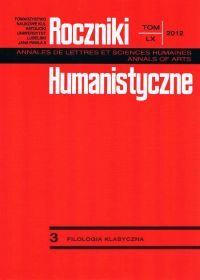An Utopian Plan of Praxagora: Aristophanic Assemblywomen in Social and Cultural Contexts
Abstract
The article is placed in the scope of research of classical studies, drama and theatre studies, and cultural studies. It is an attempt of social interpretation of Aristophanes’ Assemblywomen. Utopia, matriarchy, cultural identity of sex or stereotypes of women and men are the main questions raised in the article. An utopian project of matriarchy created in the old-Greek comedy is a basic object of interpretation. The author employs propositions of interpretation submitted by Angus M. Bowie, Gwendolyn Compton-Engle, Jerzy Łanowski, Kenneth M. De Luca, Kenneth S. Rothwell. Assemblywomen shows that a big idea which could create wealth of society can be easily metamorphosed into its opposition. It should be said that Aristophanes’ theatre achievements supplement modern social and cross-cultural research and are important and attractive texts for demanding readers/spectators of any time.
References
Arystofanes: Sejm kobiet, w: tenże, Komedie, t. 2, przeł., wstępem i przypisami opatrzyła J. Ławińska-Tyszkowska, Warszawa: Prószyński i S-ka 2003, s. 337-401.
Balejko D.K.: Teatr ról płciowych. Teorie o performatywnym charakterze tożsamości płciowej oparte na filmie Jennie Livingston “Paris Is Burning” oraz tekstach teoretycznych Judith Butler, w: Gender w humanistyce, red. M. Radkiewicz, Kraków: Rabid 2001, s. 135-145.
Bańka A.R.: Désiré Merciera ogólna teoria pewności, Katowice: Wydawnictwo Uniwersytetu Śląskiego 2008.
Bowie A.M.: Aristophanes. Myth, Ritual, and Comedy, Cambridge: Cambridge University Press 1993.
Cirlot J.E.: Słownik symboli, przeł. I. Kania, Kraków: Znak 2001.
Compton-Engle G.: Stolen Cloaks in Aristophanes’ “Ecclesiazusae”, „Transactions of the American Philological Association” 2005, nr 1, s. 163-176.
Dawson D.: Cities of the Gods. Communist Utopias in Greek Thought, Oxford and New York: Oxford University Press 1992.
De Luca K.M., Aristophanes’ Male and Female Revolutions. A Reading of Aristophanes’ “Knights” and “Assemblywomen”, Lanham: Lexington Books 2005.
Dover K.J.: Aristophanic Comedy, Berkeley: University of California Press 1972.
Fromm E.: Zdrowe społeczeństwo, przeł. A. Tanalska-Dulęba, Warszawa: PIW 1996.
Horney K., Problemy małżeństwa, w: taż, Psychologia kobiety, przeł. J. Majewski, Poznań: Dom Wydawniczy Rebis 2003, s. 104-120.
Kanavou N.: Aristophanes’ Comedy of Names. A Study of Speaking Names in Aristophanes, Berlin and New York: Walter de Gruyter 2011.
Kostek Sz.: Zmierzch komedii staroattyckiej? Wybrane problemy „Plutosa” Arystofanesa, „Symbolae Philologorum Posnaniensium Graecae et Latinae” 2011 nr 21/2, s. 51-62.
Krzak Z.: Od matriarchatu do patriarchatu, Warszawa: Trio 2007.
Łanowski J., Wstęp, w: Arystofanes, Trzy komedie. Lizystrata, Sejm kobiet, Plutos, przeł. J. Ławińska-Tyszkowska, Wrocław: Ossolineum 1981.
Ławińska-Tyszkowska J., Wstęp [do Sejmu kobiet], w: Arystofanes, Komedie, t. 2, przeł., wstępem i przypisami opatrzyła J. Ławińska-Tyszkowska, Warszawa: Prószyński i S-ka 2003s. 335.
MacDowell D.M.: Aristophanes and Athens. An Introduction to the Plays, Oxford and New York: Oxford University Press 1995.
Mizielińska J.: (De)Konstrukcje kobiecości. Podmiot feminizmu a problem wykluczenia, Gdańsk: Słowo/Obraz Terytoria 2004.
Nozick R.: Anarchia, państwo, utopia, przeł. P. Maciejko, M. Szczubiałka, Warszawa: Aletheia 2010.
Reckford K.J.: Aristophanes’ Old-and-New Comedy, Chapel Hill: University of North Carolina Press 1987.
Rothwell K.S.: Politics and Persuasion in Aristophanes’ “Ecclesiazusae”, Leiden and New York: E.J. Brill 1990.
Zumbrunnen J.: Fantasy, Irony, and Economic Justice in Aristophanes’ Assemblywomen and Wealth, „The American Political Science Review” 2006, nr 3, s. 324.
Copyright (c) 2012 Roczniki Humanistyczne

This work is licensed under a Creative Commons Attribution-NonCommercial-NoDerivatives 4.0 International License.





